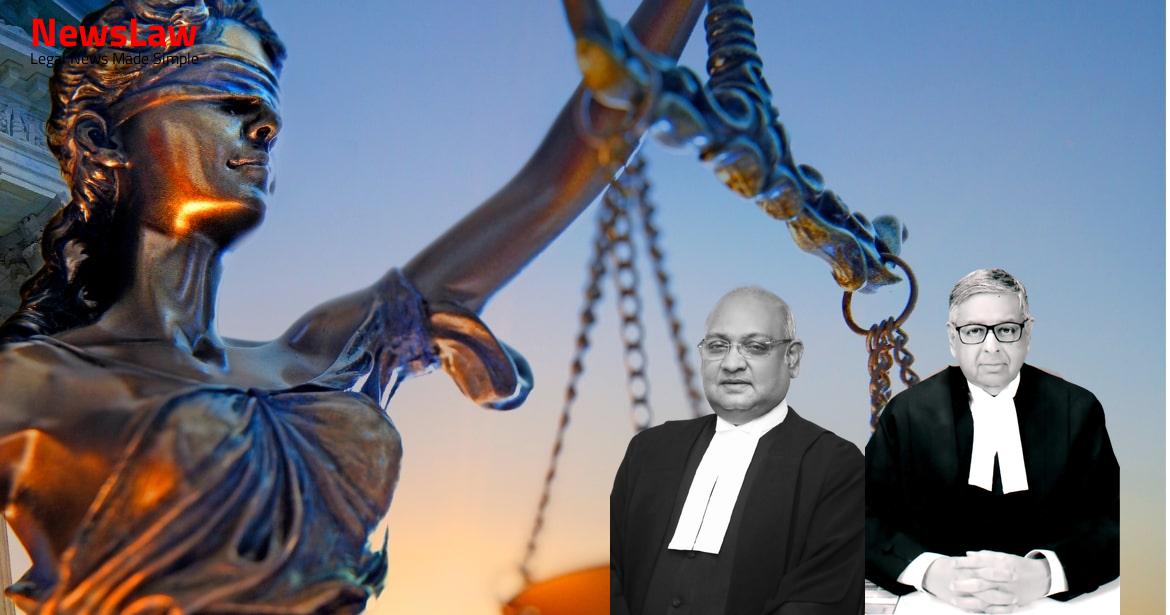Explore the intricate legal examination of trustee qualifications in a recent court case. The analysis delves into the interpretation of legal terms, principles of res judicata, and the nuances of trustee eligibility based on historical and contemporary contexts. Uncover the court’s detailed examination of the requirements for appointing a founder trustee in a Trust, shedding light on the importance of legal precision in governance matters.
Facts
- The appellant filed a suit in O.S. No 160 of 2018 before the Principal District Judge, Coimbatore, seeking recognition as the founder trustee as per the Scheme of Administration (SOA).
- Respondent Nos. 1-8 denied the appellant’s claim, stating that the previous judgment in O.S. No 631 of 2012 did not decide on the appellant’s qualifications.
- The Trial Court directed the respondent-Trust to assess the appellant’s eligibility based on the furnished documents.
- After various communications and proceedings, the matter was before the Trial Court for adjudication.
- The appellant, as the sole surviving male member from P.S.G. Narayanaswami Naidu’s family, expressed his willingness to serve as founder trustee.
- The Trial Court ruled in favor of the appellant’s qualification as founder trustee, subject to the result of the suit.
- The Board of Trustees rejected the appellant’s claim based on the requirement of permanently residing in Madras as per the SOA.
- The Trial Court held that the appellant was duly qualified to hold the position of founder trustee.
- The High Court examined the contentions of both parties, including claims from the appellant and Shri V. Rajan, regarding the founder trusteeship.
- The High Court observed that the appointment of the trustee representing the line of Shri P.S.G. Narayanaswami Naidu was the key issue to be resolved.
- Shri V. Rajan resigned earlier to facilitate the transition of trusteeship to his son, but as his son had passed away, he was entitled to the vacancy.
- The High Court found Shri V. Rajan to be qualified and directed the Board of Trustees to consider his claims and the claims of the appellant V. Prakash for the appointment of a founder trustee from the Shri P.S.G. Narayanaswami Naidu family.
- The appellant challenged this decision of the High Court in SLP(C) Nos. 23316-23318 of 2015, but it was dismissed by the Supreme Court as the main suit was withdrawn.
- Later, the appellant sent a detailed letter emphasizing his qualification according to the High Court’s findings.
Also Read: Ensuring Maintenance Rights: Court’s Legal Analysis
Issue
- The plaintiff’s entitlement to permanent injunction was questioned.
- The issue of the plaintiff being recognized as the founder trustee of the 1st defendant trust due to the demise of Mr. V. Rajan was addressed.
- Consideration of whether the plaintiffs should be granted a mandatory injunction to appoint the 2nd plaintiff as a trustee representing the branch of PSG Narayanasamy Naidu was discussed.
- The potential restraint of defendants 1 to 9 from appointing the 10th defendant to represent the branch of PSG Narayanasamy Naidu was examined.
- The question of whether defendants 1 to 9 were to be barred from making policy decisions in an upcoming board meeting was raised.
- The plaintiff’s qualifications for the post of founder trustee of the 1st defendant were questioned.
- The defendant’s argument that the plaintiff was disqualified due to being a Green Card holder or permanent resident of the USA was considered.
- Clarification on whether the suit was based on non-existent provisions in the scheme of administration dated 29-02-1936 framed by the Court of Principal Subordinate Judge, Coimbatore.
- Evaluation of the plaintiff’s entitlement to a declaration regarding the validity of board meetings held after the demise of Mr. V. Rajan without notice or plaintiff participation.
- Discussion on the legality and binding nature of the Board Meetings of the Trust held on 25.04.2012 and 30.07.2012 as sought by the plaintiffs.
- Examination of whether the first plaintiff lost competency and became ineligible to elect a successor due to resignation, as determined by the trial court.
Also Read: Analyzing Evidentiary Value in Criminal Conviction Case
Arguments
- The plaintiff-appellant asserted his right to be recognized as a founder trustee based on the Scheme of Administration.
- The plaintiff submitted evidence to prove his residence and animus to stay in India permanently.
- The issue of whether a green card holder of the USA qualifies as a person residing in Madras Presidency was debated.
- The plaintiff’s retirement, shift to India in 2010, and not applying for US citizenship indicated his animus to stay in India.
- The Trial Court granted injunction restraining interference with the plaintiff’s right as a founder trustee based on his qualifications.
- The High Court discussed the bone of contention regarding the founder trustee’s qualification relating to residence in Madras Presidency.
- The High Court noted that the bar of res judicata did not apply as the appellant’s qualification had not been previously decided on merits.
- The violation of the mandate of the Scheme of Administration regarding the timeline for filling a trustee vacancy was highlighted.
- Appellant failed to establish his animus to be a resident of India.
- Principle of res judicata cannot be applied due to qualification issue not being decided on merits.
- No conflict of interest existed between respondent-Trust and the appellant in earlier litigation.
- No disqualification was incurred by respondent-Trust for holding their post.
- The first plaintiff lost competency to contest for the office of founder Trustee after resigning.
- Only those competent to hold the post can choose a founder Trustee as per Clause [c] of Chapter IV(D) excluding the first plaintiff.
- The 2nd plaintiff and the 10th defendant were deemed eligible to be considered for the office of the founder Trustee.
- The trial court correctly directed the selection of a founder Trustee from eligible candidates among the Trustees.
Also Read: Legal Authority and Res Judicata in Representation Matter
Analysis
- The High Court made adverse comments on the Trial Court’s observation about the definition of ‘reside’ in the context of scientific advancements.
- The High Court’s observations on the interpretation of the word ‘reside’ were criticized for not aligning with document construction principles.
- The appellant’s qualification as a founder trustee was affirmed through judicial proceedings, rendering arguments around res judicata and estoppel unnecessary.
- The Trial Court’s decision regarding the appellant’s Green Card as proof of residence was supported over the High Court’s contrary conclusion.
- The High Court’s focus on counting days of stay in India was deemed insufficient in determining the appellant’s eligibility as a founder trustee.
- Contradictory interpretations of ‘reside’ based on contemporary context versus historical significance were highlighted in the judgment.
- The High Court’s approach to the term ‘reside’ in the Scheme of Administration was criticized for overlooking the practicality of modern circumstances.
- The importance of assigning a contextual and contemporary meaning to legal expressions was emphasized in the analysis of the judgment.
- Qualifications for trusteeship in the Trust as per the Scheme of Administration (SOA) were outlined, including being a Hindu, residing in the Madras Presidency, and being at least 21 years of age.
- Provisions for filling vacancies in the office of a Founder Trustee were detailed, with preference given to adult male descendants in the male line of the original founder Trustee if willing and competent.
- The process for removing a Trustee due to breach of trust or gross neglect was specified, requiring a majority resolution by the Board of Trustees.
- Any member of the board failing to attend five consecutive meetings would cease to be a member but could potentially be reappointed as per the provisions within.
- The role of Founder Trustees in selecting successors, resolving disagreements, and ensuring continuity in the Trust’s governance was emphasized.
- The question of residence in every case depends on the facts.
- The word ‘reside’ usually means something more than a flying visit or a casual stay.
- The judgment of the High Court is considered unsustainable.
- The plaintiff-appellant has successfully proven their eligibility and absence of disqualification.
- The contesting respondents did not raise the question of qualification or disqualification earlier.
- The principles of res judicata and constructive res judicata under Explanation IV to Section 11 of the Code of Civil Procedure are deemed to apply.
Decision
- Respondent No 10 appointment in the Trust stands annulled.
- Appellant entitled to hold the office of founder trustee representing P.S.G. Narayanaswami Naidu branch.
- Claim of the applicant in I.A. No 80383 of 2021 is rendered redundant and rejected.
- No costs imposed, parties to bear their own costs throughout.
- Petition seeking leave to appeal considered on 01.07.2021 revealing appointment of Shri Narayan Karthikeyan as founder trustee.
- Trial Court judgment set aside, appellant’s claim to the office of founder trustee upheld.
- Appeal succeeds, impugned judgment set aside, and Trial Court judgment and decree restored.
- Matter before the Court for determination of the validity of appellant’s claim to the office of founder trustee.
- Connected Civil Miscellaneous Petition is closed.
Case Title: V. PRAKASH @ G.N.V. PRAKASH Vs. M/S P.S. GOVINDASWAMY NAIDU AND SONS CHARITIES (2022 INSC 533)
Case Number: C.A. No.-003791-003791 / 2022



